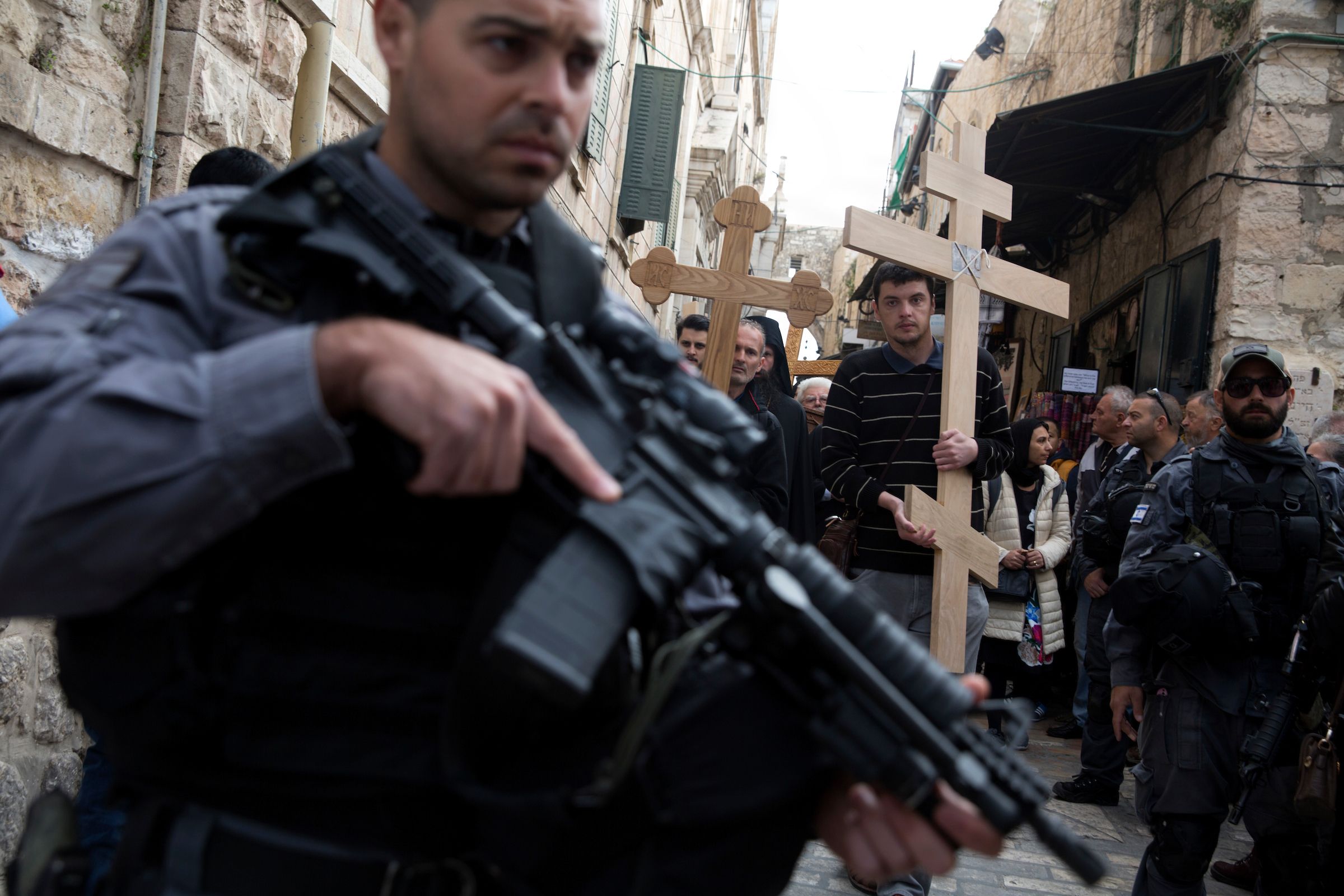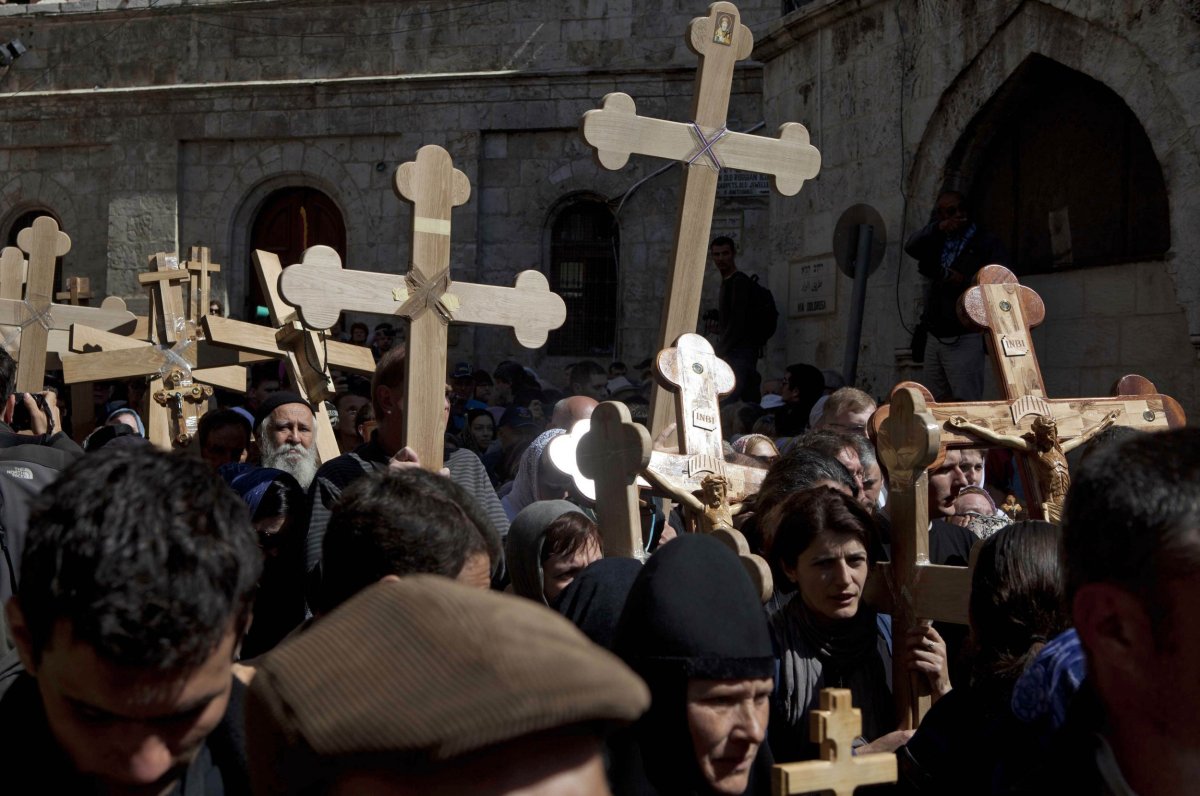
The blast waves from the Palm Sunday bombings in two Coptic churches in Egypt seemed to echo off the ancient stone walls and down the narrow warrens of the Old City of Jerusalem as Christian pilgrims from around the world gathered here for Holy Week.
Amid stepped-up security by Israeli forces, processions of Christians from Africa, Asia, Latin America, Europe and North America joined the diminishing community of local Palestinian Christians to walk the Via Dolorosa, or "The Way of Sorrow," on Good Friday. The day marks the remembrance of when Jesus was sentenced to death and crucified, and it comes before the celebration of Easter Sunday, when the Christian faith holds that Jesus rose from the dead, ascended into heaven and will come again.
The somber processions along the traditional Stations of the Cross are often emotional for the faithful, veering from crass reenactments of the Passion of Christ by a troupe from Texas with Roman centurions in plastic costumes to the soft and soulful hymns of modest pilgrims who have spent a life savings to come from as far away as Sri Lanka and Zimbabwe.
This year the bombing attacks on two Coptic Christian churches that killed 45 people just days earlier seemed to punctuate Good Friday, making it more resonant and meaningful. The so-called Islamic State militant group, or ISIS, claimed responsibility for the suicide bombings, which are the latest in a spate of attacks by Islamist militants on the Christian minority in the Middle East's most populous country, and part of a pattern of attacks over the last year by ISIS on Christian minorities in Syria, Iraq and Libya.
This year, many Christians said they were praying for and marching in solidarity with the community of Egypt's Coptic Church, which is one of the oldest in Christendom and was founded by St. Mark the Evangelist who came to Egypt in 60 A.D. And many of the pilgrims marching here in Jerusalem come from countries that know firsthand the destructive power of religious violence
This year, many Christians said they were praying for and marching in solidarity with the community of Egypt's Coptic Church, which is one of the oldest in Christendom founded by St. Mark the Evangelist who came to Egypt in 60 A.D. And many of the pilgrims marching here in Jerusalem were hailing from countries that know firsthand the destructive power of religious violence, including Serbia, Indonesia, Lebanon and Ethiopia.
Security was heightened in and around the Old City on Friday and through the Easter weekend after a 20-year-old British exchange student in Jerusalem was killed Friday in a stabbing attack, the latest in a reported wave of attacks by Palestinian militants over the last 18 months that have taken the lives of 40 Israelis and two foreigners.
Abate Tsadik, on pilgrimage from Ethiopia, wearing a bright red cap with the insignia of his Ethiopian Orthodox prayer group, said: "In our country, we don't have direct violence between Muslims and Christians. Not yet. But we fear it is coming."
He was referencing the killing of 30 Ethiopian Orthodox Christians in Libya by ISIS in 2015, a mass execution captured on video and viewed around the world.
"The fanatics want to divide us. They know exactly what they are doing," he said, "and we must not let them succeed."
Father Nenand Kesonja, dressed in the traditional black clerical garb of the Syrian Orthodox tradition was leading a pilgrimage from his Croatian village of Vukovar which suffered some of the most intense fighting of the Balkan wars of the early 1990s, said: "We know about religious violence. And on this day especially, our fervent prayers are for peace. We pray for our Christian brothers in Egypt and we pray that the whole country understands how vicious the cycle of religious violence can become."
A Pentecostal Christian from Indonesia, Frans Limantony, 39, said he came on pilgrimage with his wife because he wanted "to know this place. I only knew it from the Bible, and I wanted to see the reality and be here to pray on Good Friday and celebrate on Easter.
"On this day we feel the pain of Jesus on the cross, and we feel the pain of those who are suffering like the Copts in Egypt. As Christians we cannot tolerate that violence not in Egypt or in the many other places like Libya and Syria and even in some corners of my own country where Christians are targeted," said Limantony, referring to the spate of church bombings and attacks ordered in recent years by militant Muslim clerics in Indonesia, which is more than 90 percent Muslim.
So if the Christians of the Middle East are increasingly a target of Islamist militants like ISIS, I asked Egyptian pilgrims on "The Way of Sorrow" if they were fearful for the future.
"We are not afraid," said Father Luka Nasrallah, 47, an Egyptian Catholic priest, who was leading a pilgrimage from his hometown of Sohag, a gritty industrial city in Egypt.
Nasrallah said he felt the solidarity of the many pilgrims from around the world on this Good Friday, but he said he wanted the world to know that while life is difficult for Egyptians they "do not and will not live in fear." He said the community was traumatized, but it would carry on as it has through centuries of martyrdom which, as he pointed out, began with the very origins of the church in the earliest centuries of Christianity when they were persecuted by the Romans.
Standing with a large wooden cross that his fellow parishioners had carried on the Via Dolorosa, he said, "We are ready to meet with Jesus and this day, Good Friday, is especially a day not to be afraid."
The courage and the sorrow of Christians in the Middle East is no different than that of all people, Muslims and Jews alike, who endure the violence that surrounds them. But Christians, as a minority faith in the Arab world, say they feel they are being specifically targeted these days. They also speak of indifference and neglect by ruling governments in majority Muslim countries who have failed to protect their religious freedom as a minority faith. And so amid the violence and the economic hardship that come with the terrain, the Christian presence is diminishing as many Christians find a way to migrate to the West.
In Syria and Iraq, Christian minority communities have been displaced, brutalized and the price of failing to convert to Islam under ISIS rule has been death. In other countries like Lebanon and Jordan, decades of war and instability in the region created a steady flow of migrants to Europe and America and left the communities shrinking year after year. Because they are often affiliated with Western churches and religious institutions, the migration patterns out of the Middle East are more established and allow them to more readily find an exit.

As a result, an exodus is underway. One hundred years ago, according to Ottoman-era census data, Christians represented more than 20 percent of the total population of the Middle East. Today that number has shrunk to less than four percent, according to experts seeking to track the migration in a region where census data is nonexistent. In Israel and the West Bank and Gaza, the percentage of Christians has dwindled to what even church officials here concede is estimated to be less than 1 percent, raising fears that the living community of Christians is disappearing in the land where the faith began.
Just before the Easter vigil in the Palestinian Christian village of Beit Jala, Yakoub Qassiyeh, 60, hobbled on a cane in his home. He said he was there visiting his ailing mother, Alice, and a sister, Mary. He had left the family home in the West Bank and moved across the river to Jordan.
He explained that he made his decision after the violence of the Second Intifada broke out in late 2000 and the Qassiyeh family home was shelled by Israeli tanks, and ultimately had to be leveled and rebuilt from the ground up.
"We lost everything," he said, sitting beside a lantern with a candle lit from the flame of the "holy fires," which is a Greek Orthodox tradition in which a flame emanates from the crypt at the Church of the Holy Sepulcher and is carried in lanterns out to Christian villages to light the candles on the altar. The tradition is for parishioners to light a candle from that flame and try to keep it lit in their homes for three days as a symbol of the light of faith.
Through several years of skirmishes, Beit Jala, which sits directly across from the sprawling Israeli settlement of Gilo on the fringes of Jerusalem, had become a frontline in the Palestinian uprising. Qassiyeh's late father, Nakle, was injured during one night of the fighting and ultimately lost his leg.
Qassiyeh said he lost his popular restaurant because patrons stopped coming due to the fighting nearby. He left with his wife and three children in 2004 because, he said, "We had no choice. Christians in all the Middle East suffer like a fatherless child. They are vulnerable and fearful.
"What happened in Egypt is horrific, but it is not isolated. Look at the attacks in Iraq, Syria, Libya, Egypt and on and on. These Islamic terrorists do not look at us as human. They look at us as weak. To carry this light," he said, holding up the lantern of the Easter vigil, "is to carry a target."
Later, as he leaned on his cane and said goodbye, the wick of the candle from the "holy fires" had burned down and the flame flickered in a draft by the window and went out.
"It's alright," he said, "We will go back to the church tonight and bring a new candle."
This article is part of a series by The GroundTruth Project on Christians of the Middle East. Charles M. Sennott, the founder of GroundTruth, is also the author of "The Body and The Blood: The Middle East's Vanishing Christians." (PublicAffairs 2002)
Uncommon Knowledge
Newsweek is committed to challenging conventional wisdom and finding connections in the search for common ground.
Newsweek is committed to challenging conventional wisdom and finding connections in the search for common ground.
About the writer
To read how Newsweek uses AI as a newsroom tool, Click here.








